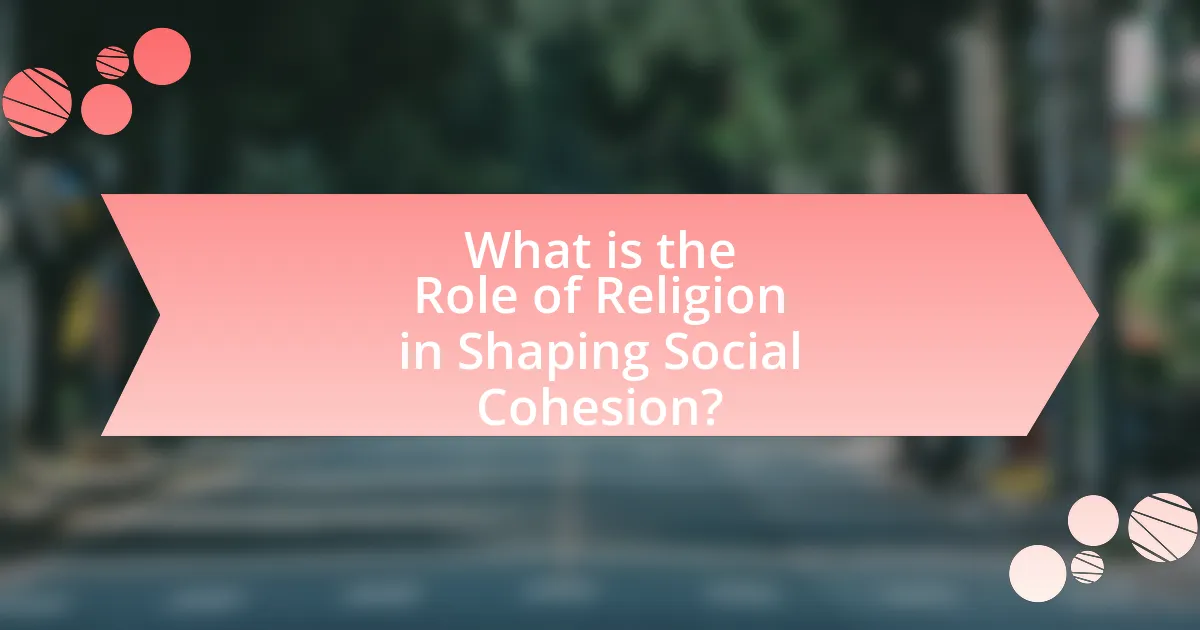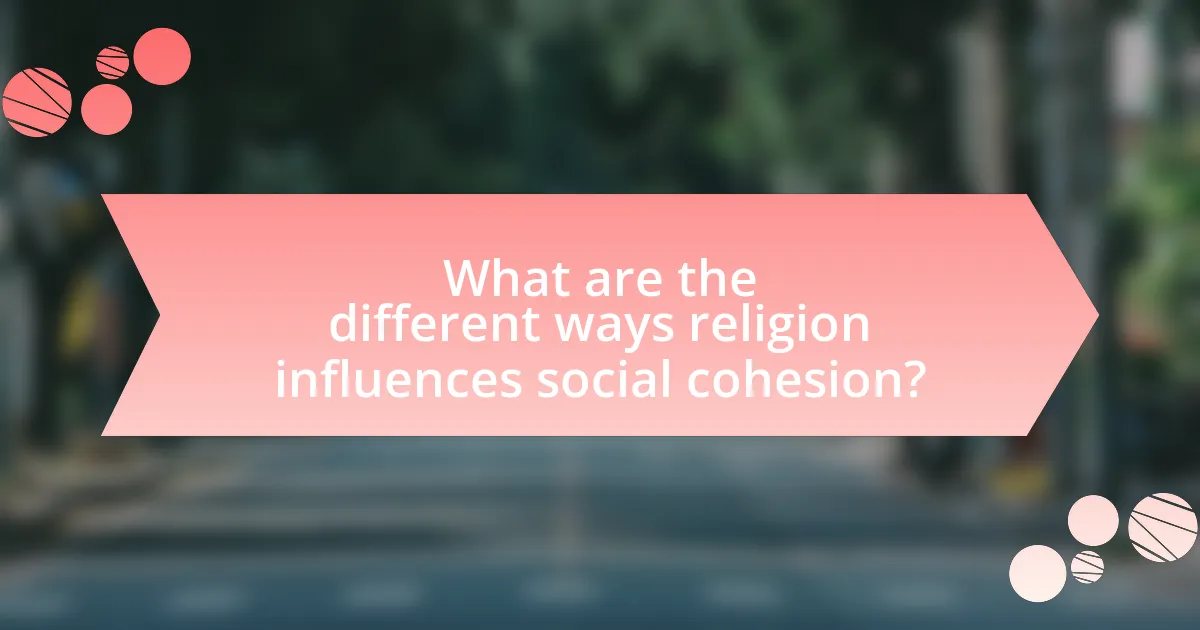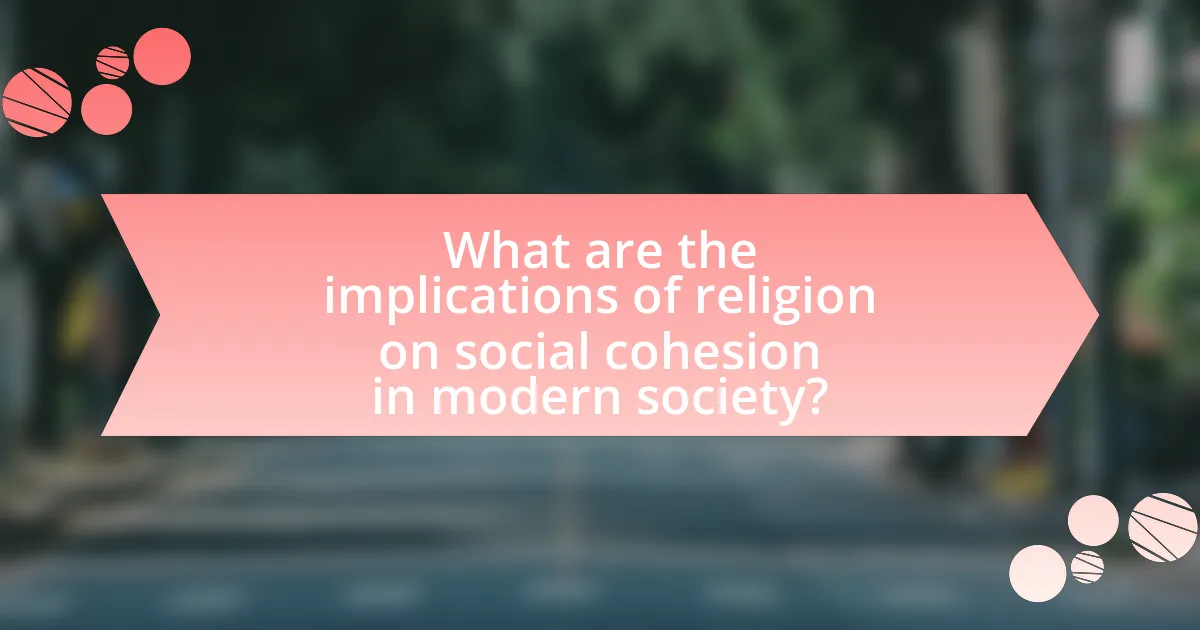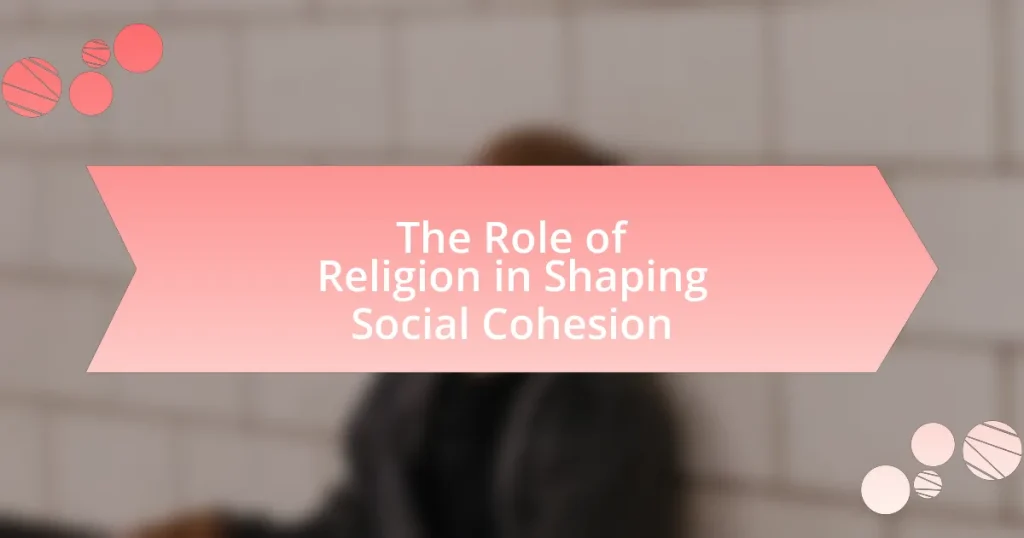The article examines the role of religion in shaping social cohesion, highlighting how shared beliefs, values, and practices foster a sense of belonging and identity within communities. It discusses the positive impact of religious participation on social networks, altruistic behaviors, and community engagement, as evidenced by research findings. Key elements such as rituals, moral guidelines, and community involvement are explored, along with the challenges posed by sectarian divisions and secularism. The article also addresses the implications of globalization and cultural diversity on religious practices, emphasizing the importance of interfaith dialogue and innovative approaches to enhance social cohesion in modern society.

What is the Role of Religion in Shaping Social Cohesion?
Religion plays a crucial role in shaping social cohesion by providing a shared set of beliefs, values, and practices that unite individuals within a community. This unification fosters a sense of belonging and identity among members, which is essential for social stability. For instance, studies have shown that religious participation can enhance social networks and promote altruistic behaviors, leading to stronger community ties. Research by Putnam and Campbell in “American Grace” highlights that religiously active individuals are more likely to engage in community service and civic activities, thereby reinforcing social bonds. Additionally, religious institutions often serve as platforms for social interaction and support, further contributing to cohesive societies.
How does religion contribute to social unity?
Religion contributes to social unity by fostering shared beliefs, values, and practices among individuals within a community. These commonalities create a sense of belonging and identity, which strengthens social bonds. For instance, religious rituals and gatherings, such as worship services and festivals, provide opportunities for individuals to connect and collaborate, reinforcing community ties. Research indicates that communities with strong religious affiliations often exhibit higher levels of social trust and cooperation, as seen in studies by Putnam and Campbell in “American Grace,” which highlight how shared religious experiences can enhance social networks and civic engagement.
What are the key elements of religious teachings that promote cohesion?
Key elements of religious teachings that promote cohesion include shared beliefs, communal practices, moral guidelines, and a sense of belonging. Shared beliefs create a common identity among followers, fostering unity. Communal practices, such as worship and rituals, strengthen social bonds and encourage collective participation. Moral guidelines provide a framework for ethical behavior, promoting trust and cooperation within the community. Additionally, a sense of belonging derived from religious affiliation enhances social networks and support systems, contributing to overall social cohesion. These elements are evidenced by studies showing that religious communities often exhibit higher levels of social capital and mutual aid compared to secular groups.
How do rituals and practices foster community bonds?
Rituals and practices foster community bonds by creating shared experiences that enhance social cohesion. These collective activities, such as religious ceremonies, festivals, and communal gatherings, provide opportunities for individuals to connect, reinforcing a sense of belonging and identity within the group. Research indicates that participation in rituals can increase trust and cooperation among community members, as evidenced by a study published in the journal “Nature” by Norenzayan and Shariff (2008), which found that shared rituals promote prosocial behavior and strengthen group ties. Thus, through the establishment of common values and mutual support, rituals and practices play a crucial role in building and maintaining community bonds.
Why is social cohesion important in society?
Social cohesion is important in society because it fosters a sense of belonging and mutual support among individuals, which enhances social stability and cooperation. When members of a community feel connected, they are more likely to engage in collective actions that benefit the group, such as volunteering, participating in civic activities, and supporting local initiatives. Research indicates that societies with high levels of social cohesion experience lower crime rates and improved mental health outcomes, as individuals are more likely to trust one another and work collaboratively towards common goals. For instance, a study by the OECD found that social cohesion is linked to economic growth and overall well-being, demonstrating its critical role in creating resilient communities.
What are the benefits of a cohesive society?
A cohesive society fosters social stability and enhances collective well-being. This stability is evident in lower crime rates, as communities with strong social ties often experience reduced violence and delinquency. For instance, research by the Pew Research Center indicates that social cohesion correlates with increased trust among community members, leading to more effective collaboration in addressing local issues. Additionally, cohesive societies tend to have better economic outcomes, as they facilitate cooperation and resource sharing, which can drive innovation and growth. Studies show that regions with high social capital, a key component of cohesion, often enjoy higher levels of economic productivity and resilience during crises.
How does social cohesion impact individual well-being?
Social cohesion positively impacts individual well-being by fostering a sense of belonging and support within communities. Individuals who experience strong social ties often report higher levels of happiness, lower stress, and improved mental health. Research indicates that communities with high social cohesion have lower rates of depression and anxiety, as social networks provide emotional support and resources during difficult times. For instance, a study published in the Journal of Health and Social Behavior found that individuals in cohesive communities are more likely to engage in healthy behaviors and have better overall health outcomes. This evidence underscores the critical role that social cohesion plays in enhancing individual well-being.
What challenges does religion face in promoting social cohesion?
Religion faces several challenges in promoting social cohesion, primarily due to sectarian divisions, differing interpretations of beliefs, and the rise of secularism. Sectarian divisions, such as those seen in Christianity, Islam, and Hinduism, can lead to conflict and exclusion rather than unity. Differing interpretations of religious texts can create factions within the same faith, undermining collective identity and cooperation. Additionally, the rise of secularism in many societies diminishes the influence of religion in public life, making it harder for religious institutions to foster a sense of community. These factors contribute to a fragmented social landscape, hindering the ability of religion to serve as a unifying force.
How do religious conflicts affect social unity?
Religious conflicts significantly undermine social unity by creating divisions among communities. These conflicts often lead to increased polarization, where individuals identify more strongly with their religious group, fostering an “us versus them” mentality. For instance, the sectarian violence in Northern Ireland between Catholics and Protestants resulted in deep social rifts, affecting community interactions and trust levels. Additionally, research by the Pew Research Center indicates that religious conflicts can lead to social fragmentation, where individuals withdraw from mixed communities, further isolating themselves within their religious groups. This fragmentation disrupts social cohesion and can escalate into broader societal issues, such as discrimination and violence.
What role does secularism play in shaping social dynamics?
Secularism plays a crucial role in shaping social dynamics by promoting the separation of religion from public life, which fosters inclusivity and pluralism in diverse societies. This separation allows individuals of various beliefs to coexist peacefully, reducing sectarian conflict and discrimination. For instance, countries with strong secular frameworks, such as France and the United States, often experience lower levels of religiously motivated violence and greater social cohesion among different cultural groups. Additionally, secularism supports the establishment of laws and policies based on reason and human rights rather than religious doctrines, which can enhance social justice and equality.
How can religion adapt to enhance social cohesion?
Religion can adapt to enhance social cohesion by promoting interfaith dialogue and community service initiatives. By fostering understanding and collaboration among diverse religious groups, faith-based organizations can reduce prejudice and build trust within communities. For instance, programs that encourage joint community service projects have been shown to improve relationships among different religious groups, as evidenced by studies indicating that shared goals lead to increased social bonds. Additionally, religious leaders can advocate for inclusivity and acceptance, which can further strengthen social ties and create a more harmonious society.
What innovative approaches can religious organizations take?
Religious organizations can adopt innovative approaches such as leveraging technology for virtual community engagement and utilizing social media platforms to foster interfaith dialogue. By implementing online services and interactive platforms, these organizations can reach a broader audience, especially younger generations who are more digitally connected. For instance, during the COVID-19 pandemic, many religious groups successfully transitioned to online worship, which not only maintained community ties but also attracted new members who might not have participated in traditional settings. This shift demonstrates the potential of technology to enhance social cohesion by making religious practices more accessible and inclusive.
How can interfaith dialogue contribute to social harmony?
Interfaith dialogue can significantly contribute to social harmony by fostering mutual understanding and respect among diverse religious communities. This dialogue encourages individuals to share their beliefs and values, which can reduce misconceptions and stereotypes that often lead to conflict. For instance, studies have shown that communities engaged in interfaith initiatives experience lower levels of prejudice and increased social cohesion. A report by the United Nations Alliance of Civilizations highlights that interfaith dialogue initiatives have successfully mitigated tensions in multicultural societies, demonstrating its effectiveness in promoting peace and collaboration.

What are the different ways religion influences social cohesion?
Religion influences social cohesion through shared beliefs, community engagement, moral guidance, and social networks. Shared beliefs create a common identity among individuals, fostering unity and belonging. Community engagement is facilitated by religious institutions that organize social activities, volunteer work, and support systems, which strengthen interpersonal relationships. Moral guidance provided by religious teachings promotes ethical behavior and social responsibility, contributing to a harmonious society. Additionally, social networks formed within religious groups offer emotional support and resources, enhancing social ties and collective resilience. These factors collectively reinforce social cohesion, as evidenced by studies showing that communities with strong religious affiliations often exhibit lower crime rates and higher levels of civic participation.
How do different religions approach social cohesion?
Different religions approach social cohesion by promoting shared values, community engagement, and moral frameworks that unite their followers. For instance, Christianity emphasizes love, charity, and fellowship, fostering community through church activities and social services. Islam encourages ummah, the concept of community, which strengthens bonds among believers through shared rituals like prayer and fasting during Ramadan. Hinduism promotes social cohesion through festivals and rituals that bring communities together, reinforcing cultural identity. Buddhism advocates for compassion and mindfulness, encouraging harmonious relationships within communities. These approaches are supported by sociological studies, such as those by Putnam and Campbell in “American Grace,” which highlight the positive correlation between religious participation and social trust.
What common themes exist across various religious teachings?
Common themes across various religious teachings include the concepts of compassion, justice, and the pursuit of a moral life. Compassion is emphasized in many religions, such as Buddhism’s principle of “karuna” and Christianity’s call to love one’s neighbor. Justice is a recurring theme, evident in the teachings of Islam regarding fairness and equity, as well as in the Hebrew Bible’s emphasis on social justice. The pursuit of a moral life is central to religious teachings, with guidelines for ethical behavior found in texts like the Quran, the Bible, and the Dharma. These themes contribute to social cohesion by promoting shared values and fostering community bonds among followers.
How do cultural contexts shape religious practices related to cohesion?
Cultural contexts significantly shape religious practices related to cohesion by influencing the values, rituals, and community structures that define those practices. For instance, in collectivist cultures, religious practices often emphasize communal worship and shared rituals, fostering a sense of belonging and unity among members. This is evident in traditions such as communal prayers during Ramadan in Islamic cultures, which strengthen social bonds and reinforce group identity. Additionally, cultural norms dictate the interpretation of religious texts and the prioritization of certain practices, which can either enhance or hinder social cohesion. For example, in societies where individualism is valued, religious practices may focus more on personal spirituality rather than community engagement, potentially weakening social ties. Thus, the interplay between cultural contexts and religious practices is crucial in determining the level of social cohesion within a community.
What role do religious leaders play in fostering social cohesion?
Religious leaders play a crucial role in fostering social cohesion by promoting shared values and community engagement. They often serve as moral guides, encouraging individuals to participate in collective activities that strengthen community bonds. For instance, studies have shown that religious institutions frequently organize events that bring diverse groups together, facilitating dialogue and understanding among different social and cultural backgrounds. This engagement can lead to increased trust and cooperation within communities, as evidenced by research indicating that areas with active religious organizations tend to exhibit higher levels of social capital and lower rates of crime.
How can leaders influence community engagement?
Leaders can influence community engagement by fostering inclusive dialogue and creating opportunities for participation. By actively involving community members in decision-making processes, leaders can build trust and a sense of ownership among residents. Research indicates that communities with engaged leadership experience higher levels of social cohesion and collective efficacy, as seen in studies conducted by the Pew Research Center, which found that inclusive practices lead to increased civic participation and stronger community ties.
What responsibilities do religious leaders have in conflict resolution?
Religious leaders have the responsibility to mediate disputes, promote dialogue, and foster reconciliation in conflict resolution. They often serve as trusted figures within their communities, leveraging their moral authority to encourage peaceful resolutions and understanding among conflicting parties. For instance, during the Rwandan genocide aftermath, religious leaders played a crucial role in reconciliation efforts, helping to rebuild trust and community ties. Their involvement can significantly influence the attitudes of followers, as seen in various peacebuilding initiatives where religious teachings are used to advocate for forgiveness and coexistence.
How does community involvement enhance the role of religion in social cohesion?
Community involvement enhances the role of religion in social cohesion by fostering connections among individuals and groups through shared values and collective activities. When community members engage in religious practices together, such as attending services, participating in charitable events, or collaborating on community projects, they build trust and mutual understanding. Research indicates that religious communities often serve as social networks that provide support and resources, which can lead to increased social capital. For instance, a study by Putnam and Campbell in “American Grace” highlights how religious congregations facilitate social ties that contribute to community resilience and cohesion. This interconnectedness reinforces the role of religion as a unifying force, promoting a sense of belonging and collective identity among diverse populations.
What initiatives can religious groups undertake to strengthen community ties?
Religious groups can undertake initiatives such as community service projects, interfaith dialogues, and social support programs to strengthen community ties. Community service projects, like food drives or neighborhood clean-ups, foster collaboration among diverse groups and enhance social bonds. Interfaith dialogues promote understanding and respect among different religious traditions, which can reduce tensions and build a sense of unity. Social support programs, such as counseling services or assistance for the needy, address community challenges and create networks of care, reinforcing the social fabric. These initiatives have been shown to improve social cohesion, as evidenced by studies indicating that active participation in community-oriented religious activities correlates with increased trust and cooperation among community members.
How do volunteer activities promote social integration?
Volunteer activities promote social integration by fostering connections among diverse community members through shared goals and collaborative efforts. These activities create opportunities for individuals from different backgrounds to interact, build relationships, and develop a sense of belonging. Research indicates that participation in volunteer work enhances social networks and encourages mutual understanding, which are essential components of social cohesion. For instance, a study published in the Journal of Community Psychology found that individuals engaged in volunteerism reported increased feelings of community attachment and reduced social isolation, demonstrating the positive impact of such activities on integrating various social groups.

What are the implications of religion on social cohesion in modern society?
Religion significantly influences social cohesion in modern society by fostering a sense of community and shared values among individuals. Religious institutions often serve as social hubs, providing support networks that enhance interpersonal relationships and collective identity. For example, studies have shown that participation in religious activities correlates with higher levels of trust and cooperation among community members, as evidenced by research from the Pew Research Center, which found that religiously active individuals are more likely to engage in charitable activities and volunteerism. Additionally, shared religious beliefs can create a common moral framework, which helps to unify diverse groups within a society, promoting social stability and reducing conflict.
How does globalization affect the role of religion in social cohesion?
Globalization influences the role of religion in social cohesion by facilitating the spread of diverse religious beliefs and practices, which can either enhance or challenge social unity. As people migrate and cultures intermingle, religious pluralism often increases, leading to greater interfaith dialogue and cooperation, as seen in multicultural societies like Canada, where diverse religious communities contribute to social harmony. Conversely, globalization can also lead to tensions and conflicts, as differing beliefs may clash, exemplified by rising religious extremism in response to perceived threats from globalization. Thus, the impact of globalization on religion’s role in social cohesion is multifaceted, promoting both integration and division within societies.
What challenges arise from cultural diversity in religious practices?
Cultural diversity in religious practices presents challenges such as misunderstandings, conflicts, and social fragmentation. These challenges arise when differing beliefs and rituals lead to miscommunication and intolerance among groups. For instance, in multicultural societies, varying interpretations of religious tenets can result in disputes over moral values and social norms, as seen in instances of interfaith tensions. Additionally, the presence of multiple religious practices can create divisions within communities, undermining social cohesion and leading to isolation or marginalization of certain groups. Research indicates that such fragmentation can hinder collaborative efforts for community development and social harmony, as diverse religious groups may struggle to find common ground.
How can religion serve as a bridge in multicultural societies?
Religion can serve as a bridge in multicultural societies by fostering shared values and promoting dialogue among diverse groups. It provides a common framework for moral and ethical standards, which can unite individuals from different cultural backgrounds. For instance, interfaith initiatives, such as the Parliament of the World’s Religions, demonstrate how religious leaders can collaborate to address social issues, thereby enhancing mutual understanding and respect. Studies indicate that communities with active religious engagement often report higher levels of social cohesion, as seen in research by Putnam and Campbell in “American Grace,” which highlights the positive correlation between religious participation and community involvement across various demographics.
What are the future trends in the relationship between religion and social cohesion?
Future trends in the relationship between religion and social cohesion indicate a growing diversification of religious beliefs and practices, which may lead to both increased pluralism and potential conflict. As societies become more multicultural, the coexistence of various faiths can enhance social cohesion through interfaith dialogue and community initiatives, fostering mutual understanding. However, this same diversity may also challenge social cohesion if religious differences lead to polarization or exclusionary practices. Research shows that in regions experiencing significant immigration, such as Europe and North America, religious institutions that promote inclusivity tend to strengthen community ties, while those that adopt more rigid stances can exacerbate divisions. Thus, the future will likely see a complex interplay between religion’s role in fostering unity and the potential for discord, shaped by societal responses to diversity.
How might technology influence religious practices and community building?
Technology significantly influences religious practices and community building by facilitating communication and access to religious content. Online platforms enable congregations to connect beyond geographical limitations, allowing for virtual worship services, discussions, and community events. For instance, during the COVID-19 pandemic, many religious organizations adopted live streaming, which increased participation rates; a study by the Pew Research Center found that 47% of U.S. adults reported attending religious services online during this period. Additionally, social media fosters community engagement and support networks, enhancing the sense of belonging among members. This shift demonstrates how technology can reshape traditional religious practices and strengthen community ties.
What role will youth play in shaping the future of religious cohesion?
Youth will play a crucial role in shaping the future of religious cohesion by fostering interfaith dialogue and promoting inclusivity. As digital natives, young people are adept at using social media platforms to connect with diverse religious communities, facilitating conversations that can bridge gaps and reduce misunderstandings. Research indicates that youth engagement in interfaith initiatives, such as the United Nations’ Youth Interfaith Network, has led to increased collaboration among different faith groups, enhancing social cohesion. Furthermore, studies show that young individuals are more likely to embrace pluralism and advocate for shared values, which can strengthen communal ties and promote peaceful coexistence among various religious traditions.
What practical steps can communities take to leverage religion for social cohesion?
Communities can leverage religion for social cohesion by fostering interfaith dialogue and collaboration. This approach encourages understanding and respect among diverse religious groups, which can reduce tensions and promote unity. For instance, initiatives like community service projects organized by multiple faith groups can create shared goals and strengthen relationships. Research indicates that interfaith activities can lead to increased social trust and cooperation, as seen in studies conducted by the Pew Research Center, which highlight the positive impact of religious diversity on community engagement. By actively involving religious leaders in community decision-making, communities can ensure that diverse perspectives are represented, further enhancing social cohesion.
How can community leaders facilitate interfaith cooperation?
Community leaders can facilitate interfaith cooperation by organizing inclusive dialogue sessions that bring together diverse religious groups to discuss common values and shared goals. These sessions can foster understanding and respect among different faiths, as evidenced by initiatives like the Interfaith Youth Core, which has successfully engaged young people from various backgrounds in collaborative service projects, promoting social cohesion. By creating platforms for collaboration, community leaders can help dismantle stereotypes and build trust, ultimately enhancing community resilience and harmony.
What best practices can be adopted to enhance religious inclusivity?
To enhance religious inclusivity, organizations and communities should implement practices such as promoting interfaith dialogue, providing education on diverse religious beliefs, and creating inclusive policies that respect all faiths. Interfaith dialogue fosters understanding and respect among different religious groups, as evidenced by initiatives like the United Nations’ World Interfaith Harmony Week, which encourages collaboration and mutual respect. Education on diverse religious beliefs can reduce stereotypes and misconceptions, leading to a more harmonious society; studies show that educational programs on religious diversity can significantly improve attitudes towards different faiths. Additionally, inclusive policies, such as allowing for religious accommodations in workplaces and schools, demonstrate respect for all beliefs and promote a culture of inclusivity.
